Iran Drinking Water Crisis Hits Tabriz, Third Day Without Water
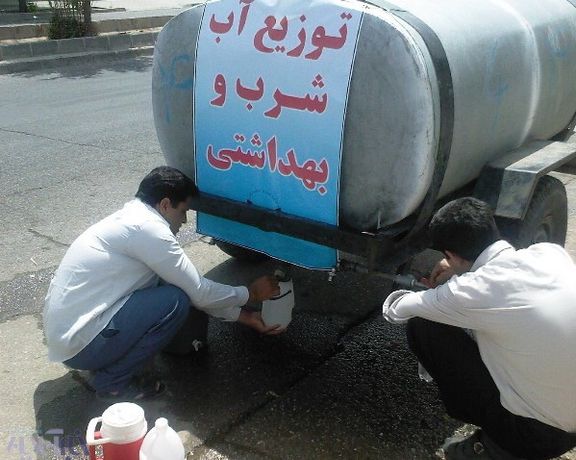
Drinking water supply in large areas of Tabriz, Iran's Northwestern city, has been cut off for three consecutive days.

Drinking water supply in large areas of Tabriz, Iran's Northwestern city, has been cut off for three consecutive days.
Residents have endured complete water cuts or limited access to low-pressure water during specific hours as temperatures soar as high as 37 degrees celsius in the East Azarbaijan Province. According to local media, the extensive water shortage was not preceded by any notification.
Mohammad Khani, CEO of East Azarbaijan Water and Sewerage Company, attributed the water cut to a sudden 20% surge in consumption due to the recent countrywide heatwave.
Pictures published by social media users of Nahand Dam, a vital water supply source for Tabriz, illustrates its alarming depletion compared to previous years.
The water crisis is not isolated to Tabriz, with widespread cuts in many other areas of East Azarbaijan province, particularly in dozens of villages. People in Jigheh village, for example, have been left with water for only 20 minutes every 72 hours, prompting them to dig wells in search of springs or other water sources.
This situation mirrors similar water shortages experienced in other Iranian cities. Zahedan endured several days of drinking water cuts in July, while Ahvaz faced similar challenges in various areas.
Even smaller towns across different provinces have been hit by drinking water cuts such as Divandarreh in Kordestan province causing residents to take to the streets to protest on Monday, resulting in injuries from tear gas fired by authorities to disperse the crowd.
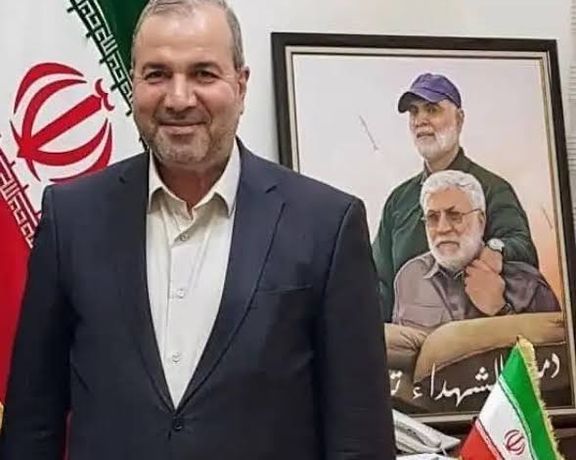
Iran's ambassador to Baghdad called for the assistance of the United Nations in “disarming Kurdish opposition parties” operating in Iraq.
In a Thursday meeting with Jeanine Hennis-Plasschaert, the Special Representative of the Secretary-General for Iraq and Head of the United Nations Assistance Mission for Iraq, Mohammad Kazem Al-e-Sadegh highlighted the activities of Kurdish parties opposing the Islamic Republic in the Kurdistan Region.
According to the IRNA state news agency, Al-e-Sadegh claimed that the UN's cooperation is necessary to counter the “threat” posed by these parties who are openly leading calls to overthrow the regime and are blamed for much of the unrest the country has witnessed since September.
Iran has previously urged both the Iraqi government and the Kurdistan Regional Government to disarm the Kurdish parties based in the Kurdistan Region. Iran's officials have warned that failing to comply with this demand would lead to military action against these parties' camps within Iraqi territory.
Last year, a security agreement was signed between Iran's former secretary of the Supreme National Security Council, Ali Shamkhani, and his Iraqi counterpart, with a significant portion dedicated to the disarmament of Iranian opposition parties in the Kurdistan region of Iraq.
Iran's Revolutionary Guards have conducted missile and drone attacks against Iranian Kurdish groups based in northern Iraq, a reaction to the Iranian Kurdish parties allegedly instigating protests, triggered by the death of Mahsa Amini, an Iranian Kurdish woman, while in the custody of the morality police.
The Kurdish parties involved, such as Komala and the Kurdistan Democratic Party of Iran (KDPI), generally advocate for Kurdish autonomy within a federal Iran.
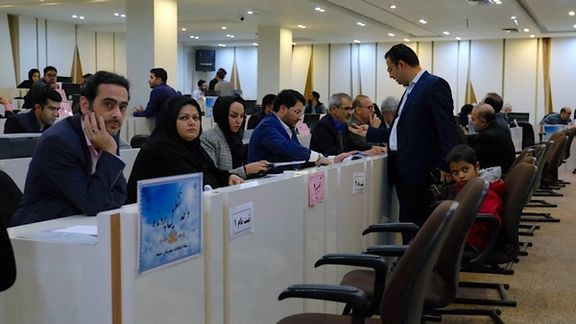
Amid expectations of a low turnout, Iran's regime has sent messages to millions of Iranians encouraging them to run in the upcoming parliamentary election.
The message, sent via SMS by the election taskforce of the Interior Ministry, has called on all potential candidates to register in the ministry’s website from August 7 to 15 to be considered for the legislative elections scheduled to take place on 1 March 2024.
Many politicians and pundits in recent weeks have been speaking of an expected low turnout after the experience of the past two elections when many relatively moderate candidates were barred from running. Some argue that voters do not see a reason to go to the polls if they have a limited choice. Many citizens are also angry at the hardliners in charge after their brutal repression of last year's protests.
Reformist commentator and seasoned journalist Abbas Abdi expressed his astonishment with a tweet, saying that the regime used to oppose “the high number of candidates; Now, they are sending millions of text messages urging people to run in the election.”
His quip was a reference to remarks by made in previous years by members of the conservative camp as well as the Guardian Council, who argued that due to "flaws" in the electoral laws in Iran, a large number of people can register and run as candidates in parliamentary and presidential elections.
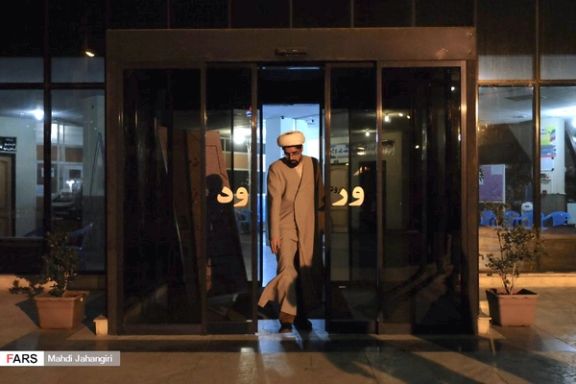
The role of the Guardian Council, a constitutional watchdog has become highly controversial after it disqualified hundreds of relatively moderate candidates in the 2020 parliamentary vote and again key leading figures in the 2021 presidential race. As a result, hardliners established total control of the legislature and are dominating all positions in the presidential administration.
Mahmoud Sadeghi, a former member of parliament and reformist activist, only posted a screenshot of the message with a caption that ironically read “No comment.”
Mohammad Sohofi, a deputy culture minister for press affairs under reformist president Mohammad Khatami, referred to the interior ministry’s text messages and said he was disqualified for the parliamentary election in 2016. With a sarcastic tone, he announced that he no longer intends to run.
The SMS seems to be a publicity stunt to feign a free political environment because politicians who may be capable of influencing the turnout – such as former Parliament Speaker Ali Larijani – cannot be invited to run with a short undirected message. The moderate conservative was the most prominent individual disqualified by the Guardian Council in 2021.
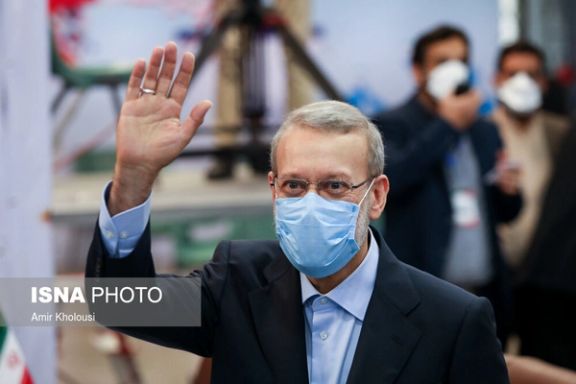
During the past several weeks, many politicians have voiced concern that barring reformist and non-conservative candidates will lead to a low turnout and lackluster elections next year. Amid concerns about Paydari party's attempts to manipulate the upcoming parliamentary elections, reformists say that the hardliner group also aims to extend its "purification" project to the Assembly of Experts (AoE), the constitutional body that would select the next Supreme Leader.
The purification project, referring to hardliners monopolizing government institutions, began with the presidential and parliamentary elections in 2021 and 2020, when relatively moderate candidates were barred from competing. Now there are suspicions that hardliners plan to repeat the same tactic in 2024, to make sure that all the members of the parliament come from the same political faction and appoint their men to the Assembly of experts.
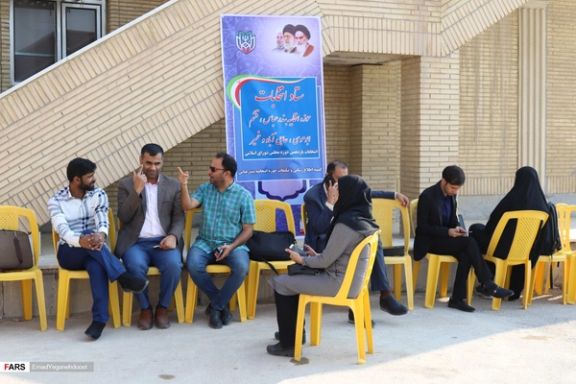
Some officials, including former interior minister and deputy intelligence minister Mostafa Pourmohammadi, are also deeply concerned about the adverse impact of the country's dire economic situation on many voters who are simply dissatisfied with all regime politicians.
Referring to Supreme Leader Ali Khamenei's call for a high-turnout election in March 2024, Pourmohammadi said in an interview with IRGC-linked Javan newspaper on Saturday that voters cannot be forced to go to the polls. He said, "People will vote if they are happy about the current situation and have high hopes about the future."
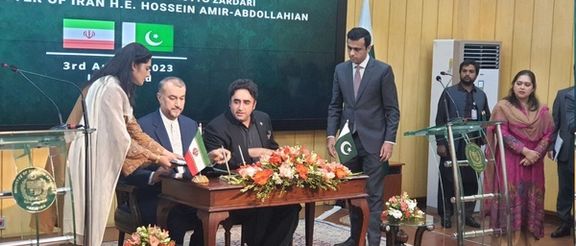
Iran’s Foreign Minister Hossein Amir-Abdollahian on Thursday called for halting Western supply of weapons to Ukraine, saying it will lead to more death and damages.
He made his comment at a joint news conference with his Pakistani counterpart Bilawal Bhutto Zardari in the capital, Islamabad.
Amir-Abdollahian arrived in Pakistan on a three-day visit the previous day.
Iran, which has been an ally of Russia in Syria and has been delivering killer drones to Moscow to use in Ukraine, has in the past claimed neutrality in the conflict.
At the news conference, Amir-Abdollahian said, “On Ukraine, we have said this all the time that we believe war is not the way and not the solution.”

However, the government media in Tehran has displayed clear support for Russia and the government or Islamic Republic officials have never condemned Moscow's attacks on civilians. So far, Russia has used hundreds of Iranian-made drones against Ukrainian civilian and infrastructure targets.
"We believe that it is a source of great concern that the United States and some Western countries keep arming Ukraine," he added.
Ukraine says that without the ability to defend itself against Russian aggression there will be no peace but instead loss of its independence and total subjugation to Russia. Many in the West believe that if Moscow is allowed to conquer Ukraine it will continue its aggression against other European countries.
The United States and its NATO allies have warned Iran not to continue its arms supplies to Russia and have imposed a series of sanctions on Tehran.
Pakistan has called for resolving the issue of Ukraine through dialogue since last year, without directly condemning the Russian invasion.
Both foreign ministers also spoke on economic relations between the two countries during the conference.
Amir-Abdollahian said both Pakistan and Iran "remain committed and determined" to move "away from borders that are mostly characterized by security concerns and issues" and more towards making them what he called "borders of economy and trade that can serve the interest of the two countries at the national level.”
Iran is under US nuclear and other sanctions restricting its oil exports and international banking, which has isolated the country from the international financial system. Pakistan is also in a difficult economic situation.
Iran also has serious issues with the Taliban in Afghanistan and may be hoping for Pakistani assistance in that regard.
Pakistan’s foreign minister Bilawal Bhutto Zardari said that “The five-year trade cooperation plan between Pakistan and Iran 2023 to 2028, which inter ally sets a bilateral trade target of US 5 billion dollars prioritizes removing impediments on bilateral trade, finalization of the free trade agreement, and the establishment of institutional linkages between our respective private sectors”.
With reporting by AP
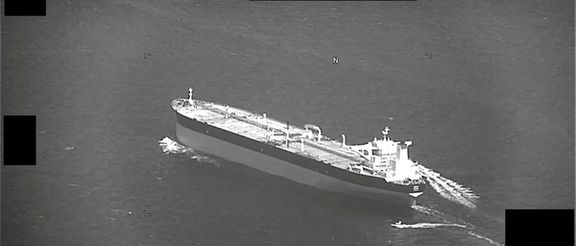
Amid attempts by Iran to hijack ships in international waters, the US may soon offer to put armed sailors and Marines on commercial ships traveling through the Strait of Hormuz, two American officials said.
The Pentagon last month sent additional F-35 and F-16 fighter jets along with a warship to the Middle East in a bid to monitor key waterways in the region following Iran's seizure and harassment of commercial shipping vessels.
After taking a commercial tanker last month, Tehran said it had an order from an Iranian court to seize a tanker in Persian Gulf waters. The Strait of Hormuz is between Iran and Oman.
In May, the White House announced that the Biden administration would be making moves in the region, but at the time did not say what they would include.
One US official, speaking on the condition of anonymity, said the military had already been training some Marines in the Middle East to be on the vessels.
But the official said it would ultimately be up to commercial vessels whether to request troops for parts of a journey that were particularly dangerous in the Strait of Hormuz.
In July, the US Navy intervened to prevent Iran from seizing two commercial tankers in the Gulf of Oman.
Since 2019, there have been a series of attacks on shipping in Persian Gulf waters at times of tension between the United States and Iran.
About a fifth of the world's crude oil and oil products passes through the Strait of Hormuz.
With the 2015 Iran nuclear deal effectively dead, Iran's relations with the West have deteriorated over the last year, leading Washington and its allies to look for ways to de-escalate tensions and a way to revive some kind of nuclear limits.
Report by Reuters
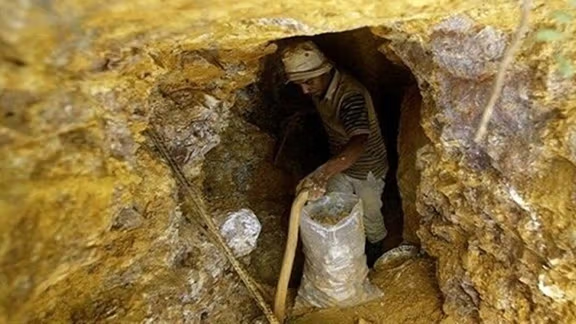
China, Russia and the Revolutionary Guards are exploiting gold mines in Iran while locals bear the brunt of their environmental hazards and discriminatory policies.
Earlier this week, the IRGC surrounded poverty-stricken Agh-Darreh village in Takab in West Azarbaijan province after clashes broke out between security forces and residents who were protesting a lack of job opportunities in a nearby gold mine. Over 50 Kurdish citizens were arrested and more than 10 people sustained injuries.
Takab is the nearest town to two of Iran’s largest gold mines, namely Agh-Darreh and Zarshouran, which account for 40 percent of the total gold production of Iran. Yet, the town – which also has about 58 other mines -- is among the poorest in Iran, along with numerous other towns located near such huge sources of wealth.
According to Iran International's Mojtaba Pourmohsen, during the past decade, the contracting company in charge of Agh-Darreh mine has laid off hundreds of seasonal workers, leading to tensions between the employees and security forces. In one case a lawsuit was filed against the mine workers and 17 of them were publicly flogged.
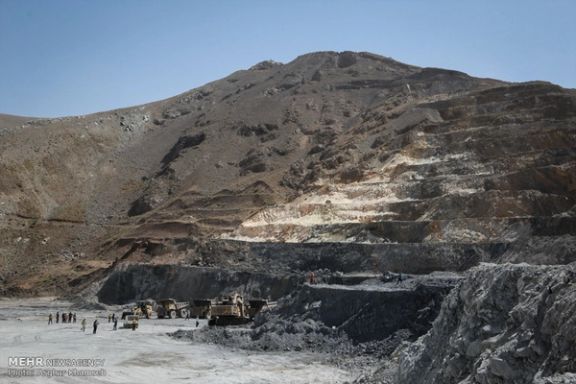
Agh-Darreh mine is owned by Pouya Zarkan mining company, one of the biggest mining cartels of Iran, founded by regime insiders Ali Kolahdouz Esfahani and Majid Ahmadi-Niri who have made millions off the gold while locals continue to live below the poverty line.
Kolahdouz, who was a deputy at Iran’s Ministry of Industries and Mines under former president Akbar Hashemi Rafsanjani, first transferred the mine’s exploitation rights to a Canadian shell company about 10 years ago. The mine was then transferred several times and finally ended up at Pouya Zarkan company. Although the shares of Pouya Zarkan Company were divided among several other companies, the new shareholders are companies belonging to the families of Ahmadi-Niri and Kolahdouz.
The current owners of the mine, which produces about one ton of gold annually, are members of the two families who currently reside in Canada, including Ali Kolahdouz himself, who lives in a mansion there. Majid Ahmadi-Niri, who was an IRGC member, died two years ago in Vancouver, leaving a huge inheritance that is the center of a legal dispute at the Supreme Court of British Columbia between Ahmadi-Niri's wife, Mojgan Shakeri-Saleh, and their two sons, Mohammad Amin and Mahdiar. Mahdiar has been featured in Dutch automobile news website Autoblog.nl for his large collection of luxury cars.
According to an investigation by the parliament, the Pouya Zarkan Company has offered hundreds of thousands of dollars in bribes to authorities in Takab and West Azarbaijan province to ignore the necessary environmental safeguards in the mines. The tailings dam of Zarshouran mine, located 35 kilometers from Takab, has resulted in cyanide leakage, posing a serious threat to the lives of the region's wildlife.
The grim situation is not limited to Takab as most of the Iranian cities near the country’s greatest mines are suffering from high unemployment rates and lack of infrastructure in addition to industrial pollution. Those in charge of the mines barely employ the locals, and the waste from these mines is so poorly managed that it has led to serious health risks for the people and their livestock.
In addition to regime insiders and IRGC members, China and Russia are also making the best use of Iran’s gold mines at the expense of the locals. The regime has reportedly handed over gold mines in seven provinces as part of the 25-year cooperation agreement with Beijing and a 20-year deal with Moscow.
Mazraeh-Shadi mine in Varzaqan, in East Azarbaijan province, estimated to have two million tons of gold ore, was handed over to a Chinese company. This company even brings its own miners from China and has only employed 20 local workers from Varzaqan. Andaryan gold mine, also near Varzaqan, with 30 million tons of gold ore, was also handed over to a Russian company.
Losing sovereignty over its rich natural resources to foreign powers, will no doubt cost the Iranian public greatly. Handing over the country's mines breaks even the regime's own constitution but once again, the authorities bend the rules around the priorities they deem greater than the needs of its own people.
Germany-based journalist Mehdi Mahdavi-Azad told Iran International, “Such audacity is not even seen in colonial contracts”.